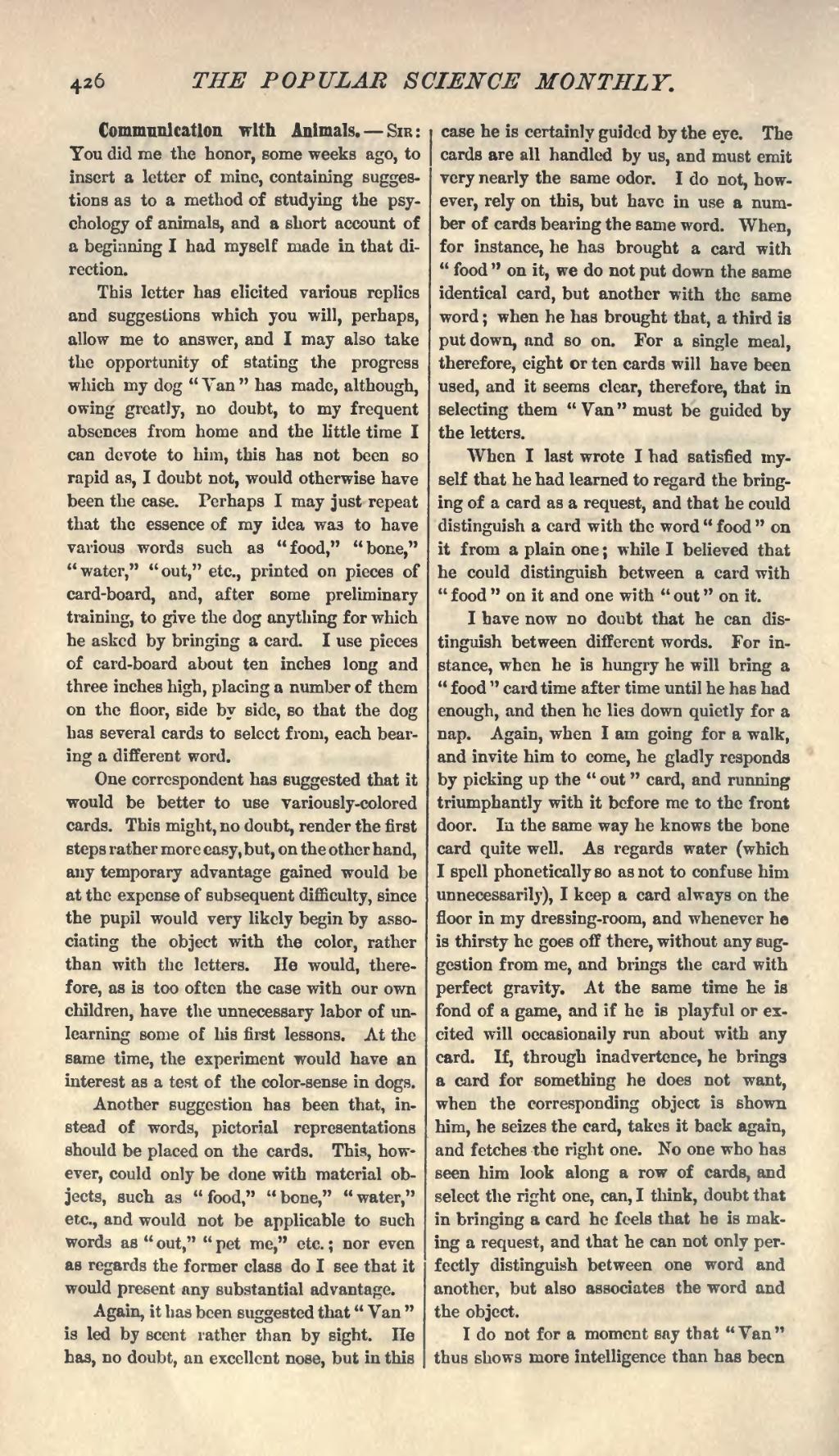Communication with Animals.—Sir: You did me the honor, some weeks ago, to insert a letter of mine, containing suggestions as to a method of studying the psychology of animals, and a short account of a beginning I had myself made in that direction.
This letter has elicited various replies and suggestions which you will, perhaps, allow me to answer, and I may also take the opportunity of stating the progress which my dog "Van" has made, although, owing greatly, no doubt, to my frequent absences from home and the little time I can devote to him, this has not been so rapid as, I doubt not, would otherwise have been the case. Perhaps I may just repeat that the essence of my idea was to have various words such as "food," "bone," "water," "out," etc., printed on pieces of card-board, and, after some preliminary training, to give the dog anything for which he asked by bringing a card. I use pieces of card-board about ten inches long and three inches high, placing a number of them on the floor, side by side, so that the dog has several cards to select from, each bearing a different word.
One correspondent has suggested that it would be better to use variously-colored cards. This might, no doubt, render the first steps rather more easy, but, on the other hand, any temporary advantage gained would be at the expense of subsequent difficulty, since the pupil would very likely begin by associating the object with the color, rather than with the letters. He would, therefore, as is too often the case with our own children, have the unnecessary labor of unlearning some of his first lessons. At the same time, the experiment would have an interest as a test of the color-sense in dogs.
Another suggestion has been that, instead of words, pictorial representations should be placed on the cards. This, however, could only be done with material objects, such as "food," "bone," "water," etc., and would not be applicable to such words as "out," "pet me," etc.; nor even as regards the former class do I see that it would present any substantial advantage.
Again, it has been suggested that "Van" is led by scent rather than by sight. He has, no doubt, an excellent nose, but in this case he is certainly guided by the eye. The cards are all handled by us, and must emit very nearly the same odor. I do not, however, rely on this, but have in use a number of cards bearing the same word. When, for instance, he has brought a card with "food" on it, we do not put down the same identical card, but another with the same word; when he has brought that, a third is put down, and so on. For a single meal, therefore, eight or ten cards will have been used, and it seems clear, therefore, that in selecting them "Van" must be guided by the letters.
When I last wrote I had satisfied myself that he had learned to regard the bringing of a card as a request, and that he could distinguish a card with the word "food" on it from a plain one; while I believed that he could distinguish between a card with "food" on it and one with "out" on it.
I have now no doubt that he can distinguish between different words. For instance, when he is hungry he will bring a "food" card time after time until he has had enough, and then he lies down quietly for a nap. Again, when I am going for a walk, and invite him to come, he gladly responds by picking up the "out" card, and running triumphantly with it before me to the front door. In the same way he knows the bone card quite well. As regards water (which I spell phonetically so as not to confuse him unnecessarily), I keep a card always on the floor in my dressing-room, and whenever he is thirsty he goes off there, without any suggestion from me, and brings the card with perfect gravity. At the same time he is fond of a game, and if he is playful or excited will occasionally run about with any card. If, through inadvertence, he brings a card for something he does not want, when the corresponding object is shown him, he seizes the card, takes it back again, and fetches the right one. No one who has seen him look along a row of cards, and select the right one, can, I think, doubt that in bringing a card he feels that he is making a request, and that he can not only perfectly distinguish between one word and another, but also associates the word and the object.
I do not for a moment say that "Van" thus shows more intelligence than has been

